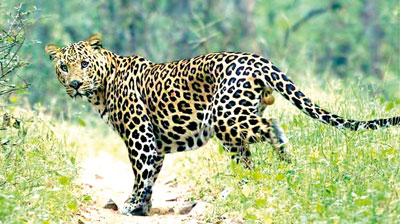The growing leopards family in Margalla Hills terrain, reportedly eight now, is vulnerable to extinction not by poachers’ guns or natural causes but deliberate poisoning.
The carnivore leopard family for its rising food requirements is forced to prey-on nearby localities’ domesticated animals, exploiting them to a constant threat of deliberate poisoning, a commonly believed tactic by locals in past to protect their livestock. They had reportedly been throwing poison laced meat loaves in the forest to get rid of these large cats.
“It’s an established fact that in past poison as a deceptive weapon had been used against these predators and threat is imminent until relevant authorities don’t come up with a plan to offer compensation to those whose animals are hunted by leopards, said Quddus Abbasi a resident of Shahdara village.
Leopard’s family in their killing spree had killed over a dozen of domesticated animals of different residents of nearby localities situated close to the hills’ forest terrain. The residents, sharing their ordeals with this scribe and asking to establish a compensation fund, said that a number of their goats and half a dozen cows and calves in recent past have been hunted by wild cats, inflicting huge financial loss to them.
“My cow was killed in a radius of just 200 meters from the house suspected by a leopard as the villagers have seen it moving with a pair of cubs nearby our habitations,” said Zakir Hussain a local. The mosque’s cleric of the same locality, Abdul Rashid, said his only buffalo was hunted by leopards which was his family’s bread and butter and “I cannot afford to buy another as an average one costs Rs 0. 2 million”.
According to information received through RTI, Islamabad Wildlife Management Board (IWMB) had found a body of a leopard in early 2018 which was in deteriorating condition. However, the source of suspected death could not be determined yet and its samples are still laying at their lab.
“After that, we had increased our surveillance for the areas and started awareness campaign regarding the importance of wildlife for the ecosystem”, said Manager Operations IWMB Sakhawat Ali.
He said that board, during the awareness campaign, engaged local community asking their help for the safety of these endangered species. When contacted for IWMB’s point of views regarding the compensation of the local’s loses occurred due to hunting of their livestock, manager operations said that they had no such mechanism to compensate the loses.









